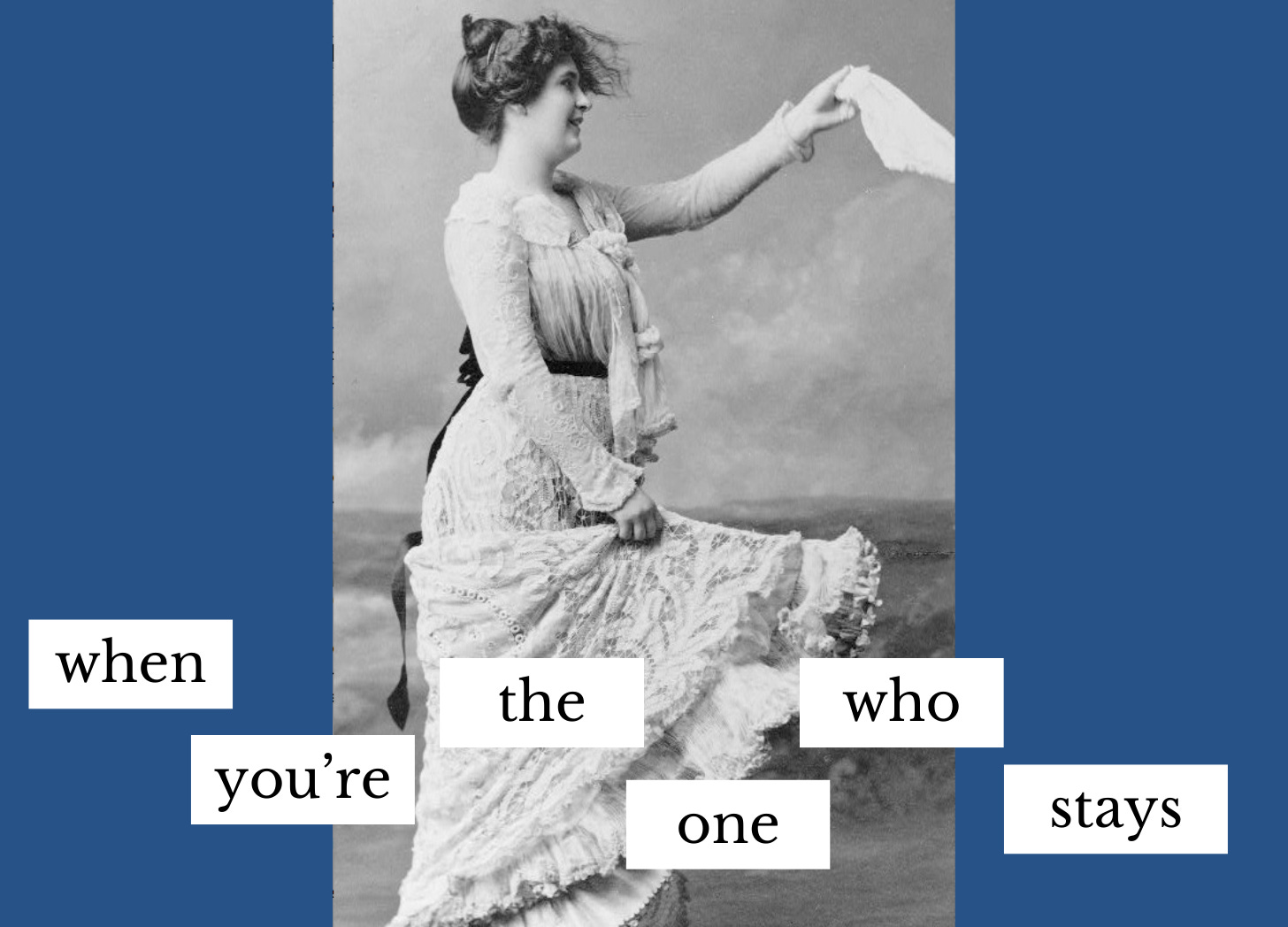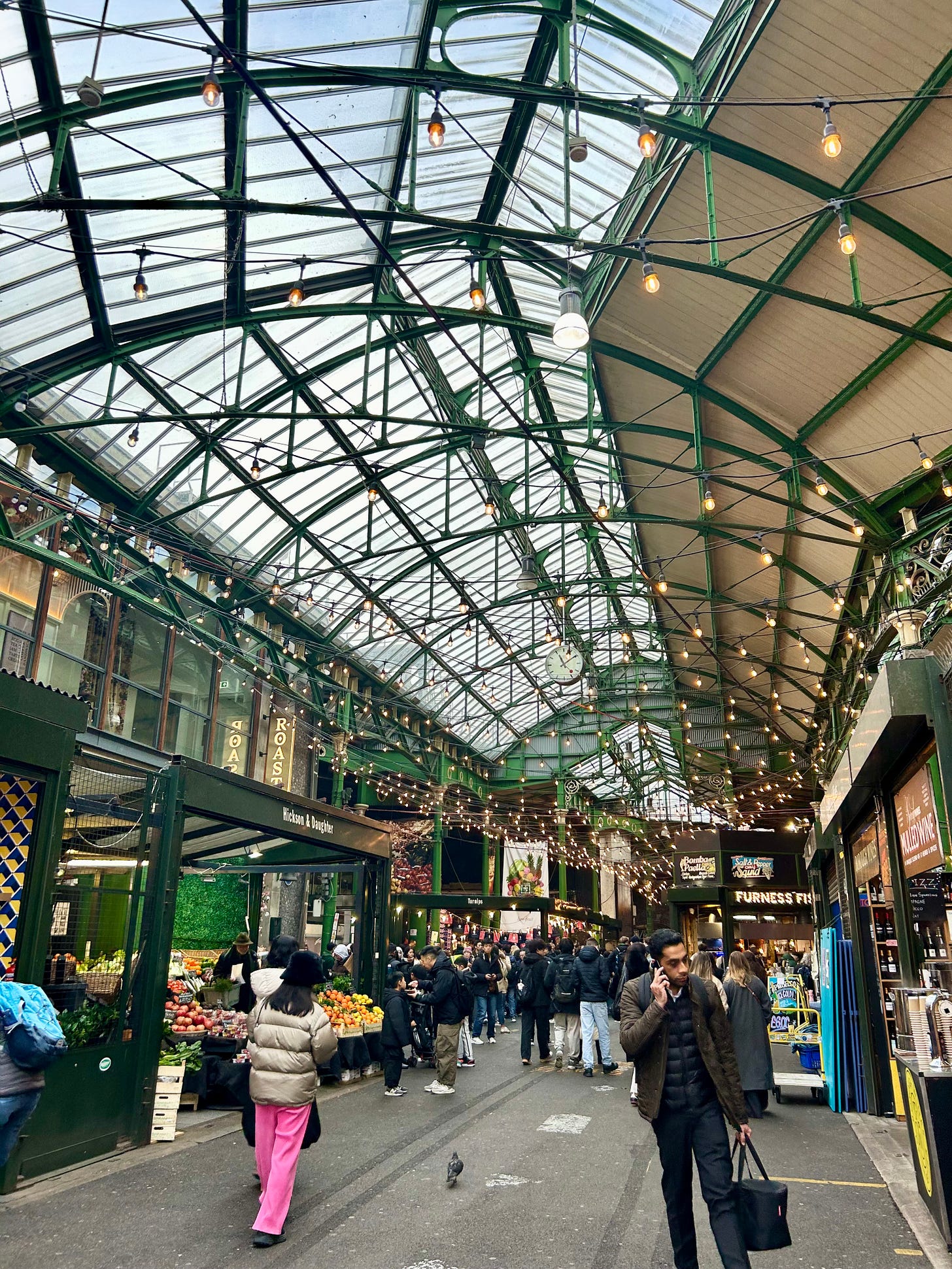When You're the One Who Stays
I often must lose something to understand how precious it really was
On a late August evening, we cried while eating at a sidewalk table. The heat, thick and matted like yarn, tightened around us. Summer clouds swelled. Our tears fell before the rain did, salting salads under our chins. The waiter, noticing our puffed eyes and mascara-ruined napkins, asked “You good?”
No, I wanted to shout. She’s moving in a few days and this entire place will flip on its head in her absence. How do you say goodbye to the person who makes this city bearable? Who made it my home? Who will I even be without her? But most overworked waiters aren’t interested in my existential crises, so I just nodded and asked for more water.
The punch of grief left me winded as we walked back to our apartment to pack what was left. The plates, the forks, the mugs from our trip to Cape Cod. Bags of cotton balls and half-full bottles of vinegar. The stuff that makes up a life, the things so forgettable in the blur of normalcy, yet so starkly painful when you see them lonely and bubble-wrapped at the bottom of a brown box.
I assumed my first heartbreak in New York would be dealt by the hand of some boy in a motorcycle jacket, but it really came from this loss of my friend. We had been living together for the past couple years, and the possibility of her moving to a new state to marry the man she loved always haunted us, like a shadowed corner in our otherwise bright and halcyon home. But the day came when she, as she put it, had to choose between New York and a really good man. She chose the good man, which I understood was right.
Throughout my life, I have mostly been the one who left. The one whose back turned toward new shores while everyone else waved goodbye. So when summer slid into autumn, the edges of foreboding winds biting bone-deep, I felt for maybe the first time what it was to stay behind.
When you’re the one who stays, everything you once shared transforms into a memory. The city grows rife with reminders: the sushi spot where you both ordered spicy tuna once a week; the nail salon with twelve-dollar manicures; the river path where you sipped iced coffees and prayed. The walk home. You get to keep these places, but they will forever be altered, morphed into a knock-off version of what you once loved. An ordinary stroll down streets you know like the back of your hand becomes a game of Russian roulette, as you can’t guess which restaurant or park could suddenly tap on the bruise, making it spread warm and purple all over again.
When we leave a shared season, step into a separated one, and say don’t worry, nothing will change, that’s pure myth. Everything will change. The love we share will stay the same, but the texture will shift with new fluctuations in proximity, in presence, in the time spent between phone calls. If friendship is about witness, then you have to find new ways to see and be seen when you can’t just pad down the hall.
I’ve collected enough friendship losses in this city to really struggle with the transient nature of it all. My next roommate and friend left the city shortly thereafter. New friends moved to the city, only to leave it within a year’s breath. A dear coworker broke the news of her departure on a walk together, and my heart sank all the way underneath 46th Street. I can grow so accustomed to the safety of shared routines, so dependent on closeness, so unaware of what’s fleeting, that I often must lose something to understand how precious it really was.
***
On a cold London street, I waited for Caroline near Borough Market. People streamed past, like ants from a sink, bodies bent against the chill. I love London—I jumped at the chance to join my husband on his business trip—but it’s not mine. It has become Caroline’s, though, since her employer sent her across the pond, satisfying a dream she’s carried close for so long. She had only been living there a couple weeks before I plodded across the steel bridge to meet her for coffee. I felt the strange off-kilter that comes from knowing your friend no longer calls home the city you once shared.
Standing on the corner, I felt muddled, the scenes at the corner of my eyes turning watercolor. So many strange faces, so many beautiful accents, so many wool coats much nicer than mine. The comfort of another English-speaking country was replaced with the jarring disorientation of it not belonging to me, and me not belonging to it. Jet lag had worn off, but my body felt wrong in this place, and something copper like homesickness filled my mouth.
Right at that moment, as I began wilting like a misplaced plant, Caroline emerged from the traffic cascading past. A familiar face rising above the clamor. I squealed and we hugged, and I remembered mid-grasp that she was living in the fulfillment of a longing she had for so long, that we were standing on the street of an answered prayer.
It is so difficult to release a friend into their calling. To celebrate their steps into some hazy, unknown land when you’re the one staying behind, not sure if they’ll be okay or if they’ll forget you or if everything you shared will evaporate into the mist. If you’ll always cry in the grocery store when you see their favorite snack.
But when you’re the one who stays, it means you also get to go—you get to go visit them in their new terrain, to stumble into their desire fulfilled, to learn more about who they really are in these new contours. As more friends leave, the wider the world splits open for you. More cities and countries become places where you can land and rest with a familiar guide. Just like Caroline’s face smiled across the crowd, right when I needed her, so will all our released friends if we find ourselves in some strange part of the world where they’ve planted their flag. Wherever we are, wherever we’re lost or stranded or just passing through, there will be someone to welcome us there, to say Here you are, here I am, and together we can make this a place where we’ll belong.






